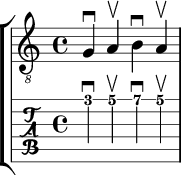The Rhythm Pyramid
Increasing the speed on the same tempo
In this exercise you will play everything from whole notes to 16th note triplets. You'll get there gradually but using the same metronome tempo. You'll be speeding up but the beat will stay the same. Here are all the rhythms you'll play and count:
The whole note. It lasts four beats in regular time. So after you strike it, you and the metronome will count to four. Try to tap your foot along with the metronome. One whole note equals four taps.

The half note lasts half as long as a whole note - that is two beats in regular time. Every two foot-taps you'll strike a half note.

Quarter notes are play once each beat. This is an easy one, you will play simultaneously with your foot and the metronome.

The quarter note triplets are played so that three triplets take up two beats. In four beats you will play a total of six notes, the first starting on the first beat and the fourth note (the second triplet) on the third beat.

Eight notes are played twice as fast as quarter notes. Two eight notes per beat - that's 8 notes per measure (4 beats).

Eight note triplets are played so that one triplet (three notes) equal one beat. That's a total of twelve notes per measure (4 triplets).

Sixteenth notes are very fast, you'll play four notes each beat so that it adds up to 16 notes per measure.

The sixteenth note quintuplet is pretty hard to count since each beat is divided into an odd amount of notes. An easy trick is to try to pronounce a 5 syllable word when you play. My word is u-ni-ver-si-ty. You can use it as well if you like.

And this is the final step of our rhythm pyramid. The sixteenth note triplet (if you count three and three together) or the sixteenth note sextuplet. Here you have to play a total of six notes per beat, that's a whole of 24 notes per measure.

F - Lydian
The idea here is to play each of the rhythms until you feel comfortable enough to go to the next one without stopping in the meantime! It's all done at the same metronome speed. It's easy to get bored with the first couple of rhythms, so try to use some string bending and vibratos. Don't set your starting tempo too high or you'll never make it to the top!
It's important to not stop in between changing rhythms as one thing you're also exercising is the transition between rhythms. When you reach the top of the pyramid, try to go down as well and slow down until you reach the whole notes again. Once you get this exercise down it's really amazing. You can substitute the licks listed here with your own and have a blast with the pyramid.
It's all played on the top two strings of the major scale. Here's the diagram for the one you'll be playing:
And here are the 9 licks of the pyramid:









Play it all together, connected, up and down the pyramid!
Here's the whole thing! Listen to it as well.
